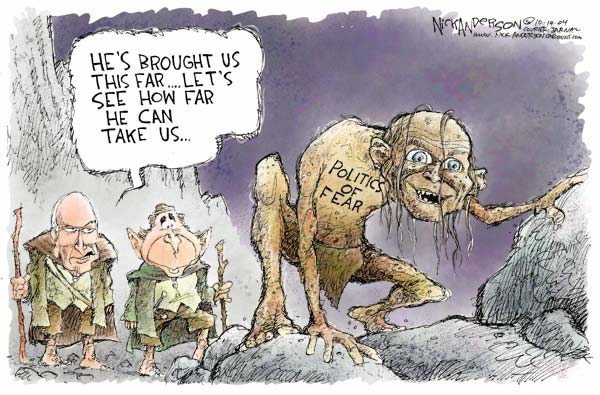|
October 28, 2005
I'm in a rush today as I am on the road with limited internet access. This image caught my eye. It's a tough one and resonates deep in our psyche.:

Nick Anderson
Is that image a reasonable representation of how the conservatives (eg., Bush, Howard and the necons) play the politics of fear?
Update:1 Nov. 2005
In the link above Frank Furedi writes about the politics of fear in a convincing way. He says:
As I argue in my book Culture of Fear: Risk Taking and the Morality of Low Expectation, fear has become a powerful force that dominates the public imagination. This was the case for some time before 9/11, and its ascendancy has not been predicated on the issue of terrorism.
The defining feature is the belief that humanity is confronted by powerful destructive forces that threaten our everyday existence. The line that used to delineate reality from science fiction has become blurred. So government officials have looked into the alleged threat posed by killer asteroids to human survival; some scientists warn that an influenza pandemic is around the corner; others claim that 'time is running out' for the human race unless we do something about global warming. 'The end is nigh' is no longer a warning issued by religious fanatics; rather, scaremongering is represented as the act of a concerned and responsible citizen.
The end is nigh is now prevalent in our culture. We have so many scarry narratives these days and politics has internalised the culture of fear. The conservatives have deployed it--immigration, terrorism, interest rates---to retain their hold on power. The social demmocrats in Australia (the ALP) have been left floundering.
|

Furedi completely ignores the media's role in getting us to the point where we will accept new anxieties that are fabricated from thin air, and rammed home through repitition.
Politicians use the media as their main means to communicate with voters/public. The media is largely one heavily crafted troll. Politicians have to fit their message into a media which is permanently in troll mode.